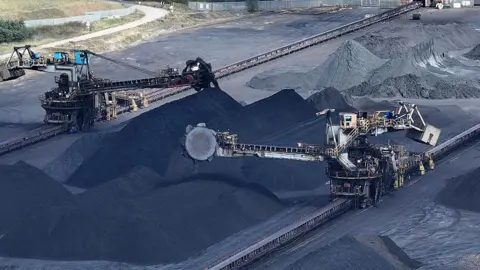The situation surrounding British Steel’s Scunthorpe blast furnaces has recently taken a critical turn. With a vital shipment of raw materials set to arrive shortly, it appears the government has successfully intervened to ensure the continued operation of these key facilities. According to reports, supplies including coking coal and iron ore sourced from the United States are scheduled for delivery on a Tuesday, following a momentous period of resource scrambling.
The urgency of this shipment is underscored by the previous tension regarding supply shortages. The raw materials, which are crucial for maintaining the blast furnaces’ operations, are to be unloaded at Immingham docks before being transported to the Scunthorpe site. Notably, a separate shipment from Australia was also reinstated after legal disputes between the British government and Jingye, the current owner of British Steel, were amicably resolved.
This governmental intervention comes on the heels of a breakdown in talks with Jingye concerning the future of British Steel. The government stepped in after allegations surfaced that Jingye was considering shutting down the furnaces, prompting immediate action to secure the necessary resources to prevent production halts. The cessation of operations would have wider implications for the UK’s steel production capabilities.
Should the furnaces run out of power, the repercussions could be significant. The ability to manufacture virgin steel—a form of steel produced directly from raw iron— hinges significantly on the consistent operation of the furnaces. Viral courses of action must be taken, as restarting these furnaces once they cool can be both complex and prohibitively expensive. This process is not merely an industry concern but has ramifications for national infrastructure projects, as virgin steel is extensively used in constructions such as buildings and transport networks.
The articles indicate that the government has assured there is enough material coming from the US to sustain the Scunthorpe operations for several weeks, and officials have committed to establishing a steady supply chain to maintain operations. While specifics on the total financial outlay by the government have not been disclosed, the decision to purchase these resources was crucial to the potential survival of a plant that directly employs around 2,700 workers.
On the frontlines of this effort, Business Secretary Jonathan Reynolds is set to visit Immingham on the scheduled delivery day, emphasizing the government’s decisive action in securing critical materials while emphasizing the reliance of various UK industries on the ongoing operations of British Steel. The government has adopted a proactive stance in ensuring the viability of the steel sector, given its importance to numerous vital industries within the UK.
With the backdrop of these developments, Beijing has voiced concerns, accusing the British government of “politicising trade” and insinuating that this move may deter investment in the UK. Tensions have further spiked, particularly given that an emergency law was rapidly passed through Parliament to assert government control over the Scunthorpe facility to prevent Jingye from implementing its shutdown plans.
While the government has appointed two former British Steel employees to oversee operations temporarily, concerns linger regarding the future of Chinese investments in sectors deemed strategically important by the UK. Although the government has not fully reverted British Steel to public ownership, discussions about nationalisation remain open, as do prospects for potential private investors to step in.
The necessity of this intervention stems from Jingye’s previous announcement regarding significant financial losses at the Scunthorpe site—reportedly losing £700,000 daily, declared unsustainable. Negotiations last week failed to yield a breakthrough when the company rejected a substantial government offer of £500 million to aid operations, insisting on a far greater sum without providing sufficient guarantees for continued operations.
Ultimately, the situation highlights the delicate balance between maintaining strategic industrial capabilities and navigating international relations, especially concerning foreign investments.



